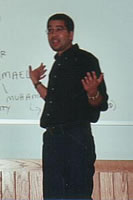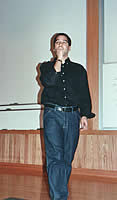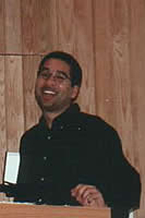 |
Guest
Speaker: Faisal Alam
Queer and Muslim:
Faisal Alam Speaks Out
By John Byrne (News Editor for the Review)
 If
you thought being queer was hard, try being queer and Muslim. Faisal
Alam, an internationally renowned activist in Muslim and queer communities
spoke last week to a crowd of 100 students, faculty and staff. Tracing
his life from a marginalized high school senior in Connecticut, to a
devout brother in his faith at Northwestern University in Boston, Alam
spoke about living two lives: Muslim by day, and homosexual by night.
By day, he was an avid participant in the Muslim students association
and a vocal brother on campus. By night, he was gay, reveling in his
identity at gay clubs. Alam said that he was engaged to a woman for
several months while at college, but that she had broken it off, saying
that she had a religious experience and felt that something was wrong
with their relationship. "Those two lives really came crashing
down," he said, "when I had a nervous breakdown." After
this breakdown in 1996, Alam quietly started an online mailing list
to broach the issue of being both queer and Muslim. Moments after he
made his initial post, individuals began subscribing from around the
world. "Literally, within minutes, people had started subscribing,"
he said. For the first year of the listserv, Alam was the only one posting
messages, since people were so scared to come out, he said. Another
year later, in 1998, he held the first international gathering of queer
Muslims in Washington, D.C. There, the group decided that they could
no longer keep their movement under the radar. "After three days
of intense dialogue we decided we could no longer be silent," he
said. The organization, Al-Fatiha, an international organization dedicated
to Muslims who are lesbian, gay, bisexual, transgendered and questioning,
now has chapters in the United States, the United Kingdom and Canada.
Alam spoke of the challenges that queer men and women face in countries
across the world, and sought to If
you thought being queer was hard, try being queer and Muslim. Faisal
Alam, an internationally renowned activist in Muslim and queer communities
spoke last week to a crowd of 100 students, faculty and staff. Tracing
his life from a marginalized high school senior in Connecticut, to a
devout brother in his faith at Northwestern University in Boston, Alam
spoke about living two lives: Muslim by day, and homosexual by night.
By day, he was an avid participant in the Muslim students association
and a vocal brother on campus. By night, he was gay, reveling in his
identity at gay clubs. Alam said that he was engaged to a woman for
several months while at college, but that she had broken it off, saying
that she had a religious experience and felt that something was wrong
with their relationship. "Those two lives really came crashing
down," he said, "when I had a nervous breakdown." After
this breakdown in 1996, Alam quietly started an online mailing list
to broach the issue of being both queer and Muslim. Moments after he
made his initial post, individuals began subscribing from around the
world. "Literally, within minutes, people had started subscribing,"
he said. For the first year of the listserv, Alam was the only one posting
messages, since people were so scared to come out, he said. Another
year later, in 1998, he held the first international gathering of queer
Muslims in Washington, D.C. There, the group decided that they could
no longer keep their movement under the radar. "After three days
of intense dialogue we decided we could no longer be silent," he
said. The organization, Al-Fatiha, an international organization dedicated
to Muslims who are lesbian, gay, bisexual, transgendered and questioning,
now has chapters in the United States, the United Kingdom and Canada.
Alam spoke of the challenges that queer men and women face in countries
across the world, and sought to  counter
assumptions many Americans may have about his faith. "In some Islamic
countries, coming out of the closet may be a death sentence," he
said. "What we are fighting against is 1,400 years of interpretation."
"Straight, presumably homophobic men," he added, "have
interpreted our faith." Alam traces this Islamic aversion to male
homosexuality to a portion of the Koran which speaks of the Nation of
Lot, which is referenced in Christian religions as the story of Sodom
and Gomorrah. He argued that the fall of Lot was not because of homosexuality,
but because sex was being forced on its citizens. Equally important,
citizens of Lot were stealing and were not being hospitable to their
guests. But the life experiences for gay, lesbian, bisexual, transgendered
and questioning Muslims takes on a very different face across the world,
Alam said. "We"re not as invisible as people would like to
believe and we're not as oppressed," he said. counter
assumptions many Americans may have about his faith. "In some Islamic
countries, coming out of the closet may be a death sentence," he
said. "What we are fighting against is 1,400 years of interpretation."
"Straight, presumably homophobic men," he added, "have
interpreted our faith." Alam traces this Islamic aversion to male
homosexuality to a portion of the Koran which speaks of the Nation of
Lot, which is referenced in Christian religions as the story of Sodom
and Gomorrah. He argued that the fall of Lot was not because of homosexuality,
but because sex was being forced on its citizens. Equally important,
citizens of Lot were stealing and were not being hospitable to their
guests. But the life experiences for gay, lesbian, bisexual, transgendered
and questioning Muslims takes on a very different face across the world,
Alam said. "We"re not as invisible as people would like to
believe and we're not as oppressed," he said. "Sexuality
takes a very, very different shape abroad "sexuality is not politicized."
He said that female sexuality is invisible, so lesbianism is often tolerated.
His organization, Al-Fatiha, has received a death sentence from an extremist
Muslim group based in Britain, and does not publicly disclose the location
of their meetings in advance. Alam closed by arguing that the gay movement
has become caught up on its own agenda, and could better fight within
the context of other oppressed peoples, in the way the civil rights
movement did. "Each of our struggles are all interconnected,"
he remarked. "Fighting our battles simultaneously is the only way
we can escape." The talk was coordinated by Queers and Allies of
Faith, and sponsored by the Multicultural Resource Center, the Lesbian,
Gay, Bisexual and Transgendered Union, Liberated Unitarian Universalist
Voices, the Asian American Alliance and an anonymous donor. "Sexuality
takes a very, very different shape abroad "sexuality is not politicized."
He said that female sexuality is invisible, so lesbianism is often tolerated.
His organization, Al-Fatiha, has received a death sentence from an extremist
Muslim group based in Britain, and does not publicly disclose the location
of their meetings in advance. Alam closed by arguing that the gay movement
has become caught up on its own agenda, and could better fight within
the context of other oppressed peoples, in the way the civil rights
movement did. "Each of our struggles are all interconnected,"
he remarked. "Fighting our battles simultaneously is the only way
we can escape." The talk was coordinated by Queers and Allies of
Faith, and sponsored by the Multicultural Resource Center, the Lesbian,
Gay, Bisexual and Transgendered Union, Liberated Unitarian Universalist
Voices, the Asian American Alliance and an anonymous donor.
|
 |
 |





